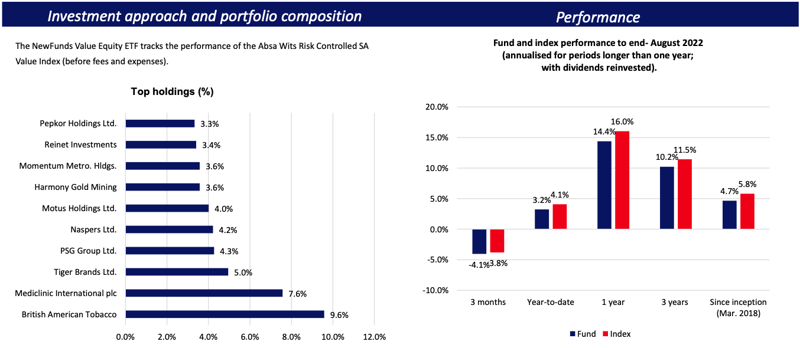Know your ETF - NewFunds Value Equity ETF
NewFunds Value Equity ETF
Given the inflationary and monetary tightening shocks to global economic activity and company earnings prospects, it comes as no surprise that major indices are down this year. The MSCI World is down 19.6% in dollar terms this year (to 22 September) while locally, the all share index dropped 11.4%. However, a cursory glance at SA’s top-performing ETFs shows that platinum is in the lead followed by income ETFs and the NewFunds Value Equity ETF.
Value investing favours cheap shares that are highly sensitive to economic conditions (including overall activity, inflation, interest rates and growth). It favours such shares as they typically trade at attractive prices which proponents of the style often view as too cheap given their positive expectations that the market may underappreciate due to pessimism.
The NewFunds Value Equity ETF provides investors with value exposure – it tracks the performance of the Absa Wits Risk- Controlled SA Value Index, which includes 30 diversified and highly liquid shares that have low price:earnings and price:book ratios. Company share weights are determined using an equal risk contribution weighting scheme. One of the key benefits of this scheme is that it aids diversification through reduced concentration, which means no single share contributes overly to risk and return.
However, we believe that the specialised nature of the index and the lack of alternative value equity ETFs listed on the JSE contribute to its total investment cost of 0.78%, which is relatively steep compared to the average (0.24%) of SA’s top 40 ETFs. As at end-August, the MSCI World declined 17.5% year-to-date, while its growth counterpart dropped 24.8%. However, value was relatively stronger, losing only 10.5%.
Broadly, we believe global equity markets
favoured value over this period as inflation concerns and an increasingly hawkish monetary stance out of the US meant a higher cost of capital for all equities. Growth companies, however, are more sensitive to hikes in interest rates as they are typically defined by technology-led, new and even disruptive business models in the earlier stages of their life-cycles.
A key characteristic of such businesses is that some may not be profitable in the early stages of the life cycle, which makes them even more sensitive to higher interest rates as their expected future cash flows are discounted at higher rates which negatively affects their share prices.
Despite this economic relationship, growth shares appear to have bucked the overall trend in mid-August as investors changed their focus from stagflation (rising inflation and slowing economic growth) to a possible recession and seemed willing to pay for high- growth companies. Using S&P 500 index data from mid-June to mid-August, the Financial Times reports that the S&P 500 growth index delivered 22.0%, outperforming its value counterpart (also S&P 500) that only managed 13.0%.
On that basis, the Financial Times further notes that more fund managers expect growth to outperform value over the next year, based on a Bank of America survey in July of 250 investment managers.
Despite MSCI index data (as at August) showing growth outperforming value in the last three months, the respective valuation indices reveal notable differences relevant to ETF investing. The MSCI value index trades at a forward price:earnings ratio of 11.5x and a dividend yield of 3.3%, both of which are more favourable than the MSCI growth index that trades at a forward price:earnings ratio of 22.5x and dividend yield of 1.0%. As a result, investors may have to throw the dice at growth companies generating actual earnings to justify the high forward PE ratio. We however note this may be challenging, given the increasingly difficult trading conditions for such growth companies.
Locally, another crippling bout of load- shedding, rising interest rates and prices as well as low fixed investment are major headwinds facing JSE-listed companies. However, the NewFunds Value Equity ETF stands to benefit from increased interest rates in SA. It has a 33.4% weight in financials and the local central bank’s latest 75 basis points increase in the repo rate (to 6.25%) should support net interest income at commercial banks.
Undoubtably, SA’s economic outlook is poor and Intellidex economists forecast economic growth of 2.3% this year before growth in local output declines to just 2.1% in 2023. As a result, we believe a margin of safety is key. Accordingly, local fund manager Anchor Capital (Q3 asset allocation outlook) estimates that the local market traded at a forward PE of just 8.0x in early August and it still expects double-digit earnings growth from financials, which are trading at undemanding levels.
As such, we think the NewFunds Value Equity ETF can be beneficial for investors as part of an overall portfolio. This is based on the value added nature of diversification (in and away from local equities) as well as the investment strategy of buying at discount prices in an equity market such as SA. We believe that this approach should bode well for investors.

Fund suitability
-
ETF suits investors with a meaningful risk appetite and a long-term investment horizon.
Fees
- The fund has a total investment cost of 0.78%.
Top 5 Sectors (%)
- Financials - 33.4%
- Basic Material - 21.2%
- Consumer Goods - 14.5%
- Health care - 10.6%
- Consumer Services - 7.3%
New to investing and want to learn more about other ETFs?
Read: Top Fund Picks for December
Background: Exchange-traded funds (ETFs)
Exchange-traded funds (ETFs) are passively managed investment funds that track the performance of a basket of pre-determined assets. They are traded the same way as shares and the main difference is that whereas one share gives exposure to one company, an ETF gives exposure to numerous companies in a single transaction. ETFs can be traded through your broker in the same way as shares, say, on the EasyEquities platform. In addition, they qualify for the tax-free savings account, where both capital and income gains accumulate tax free.
Benefits of ETFs
- Gain instant exposure to various underlying shares or bonds in one transaction
- They diversify risk because a single ETF holds various shares
- They are cost-effective
- They are liquid – it is usually easy to find a buyer or seller and they trade just like shares
- High transparency through daily published index constituents
Disclaimer
This research report was issued by Intellidex (Pty) Ltd. Intellidex aims to deliver impartial and objective assessments of securities, companies or other subjects. This document is issued for information purposes only and is not an offer to purchase or sell investments or related financial instruments. Individuals should undertake their own analysis and/or seek professional advice based on their specific needs before purchasing or selling investments. The information contained in this report is based on sources that Intellidex believes to be reliable, but Intellidex makes no representations or warranties regarding the completeness, accuracy or reliability of any information, facts, estimates, forecasts or opinions contained in this document. The information, opinions, estimates, assumptions, target prices and forecasts could change at any time without prior notice. Intellidex is under no obligation to inform any recipient of this document of any such changes. Intellidex, its directors, officers, staff, agents or associates shall have no liability for any loss or damage of any nature arising from the use of this document.
Remuneration
The opinions or recommendations contained in this report represent the true views of the analyst(s) responsible for preparing the report. The analyst’s remuneration is not affected by the opinions or recommendations contained in this report, although his/her remuneration may be affected by the overall quality of their research, feedback from clients and the financial performance of Intellidex (Pty) Ltd.
Intellidex staff may hold positions in financial instruments or derivatives thereof which are discussed in this document. Trades by staff are subject to Intellidex’s code of conduct which can be obtained by emailing mail@intellidex.coza.
Intellidex may also have, or be seeking to have, a consulting or other professional relationship with the companies mentioned in this report.
Subscribe To Our Research Portal
Search all research
Let Us Help You, Help Yourself
From how-to’s to whos-whos you’ll find a bunch of interesting and helpful stuff in our collection of videos. Our knowledge base is jam packed with answers to all the questions you can think of.


